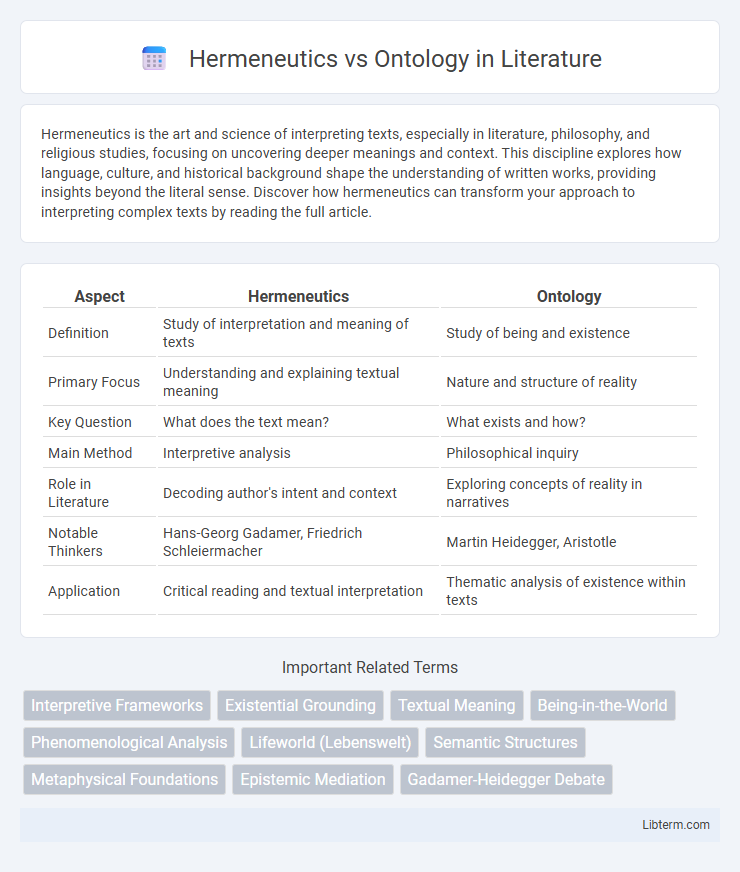Hermeneutics is the art and science of interpreting texts, especially in literature, philosophy, and religious studies, focusing on uncovering deeper meanings and context. This discipline explores how language, culture, and historical background shape the understanding of written works, providing insights beyond the literal sense. Discover how hermeneutics can transform your approach to interpreting complex texts by reading the full article.
Table of Comparison
| Aspect | Hermeneutics | Ontology |
|---|---|---|
| Definition | Study of interpretation and meaning of texts | Study of being and existence |
| Primary Focus | Understanding and explaining textual meaning | Nature and structure of reality |
| Key Question | What does the text mean? | What exists and how? |
| Main Method | Interpretive analysis | Philosophical inquiry |
| Role in Literature | Decoding author's intent and context | Exploring concepts of reality in narratives |
| Notable Thinkers | Hans-Georg Gadamer, Friedrich Schleiermacher | Martin Heidegger, Aristotle |
| Application | Critical reading and textual interpretation | Thematic analysis of existence within texts |
Introduction: Defining Hermeneutics and Ontology
Hermeneutics is the art and science of interpretation, primarily concerned with understanding texts, language, and symbolic expressions within historical and cultural contexts. Ontology, a branch of metaphysics, focuses on the nature of being, existence, and the categorization of entities and their relationships in reality. Defining hermeneutics involves exploring interpretative frameworks, while defining ontology entails investigating the fundamental structure and essence of what exists.
Historical Background and Philosophical Roots
Hermeneutics emerged from the ancient practice of interpreting sacred texts, with significant contributions from philosophers like Friedrich Schleiermacher, Wilhelm Dilthey, and Hans-Georg Gadamer emphasizing understanding human experience and historical context. Ontology, rooted in Aristotelian philosophy, studies the nature of being and existence, focusing on categorizing entities and their relationships within reality. Both disciplines evolved through continental philosophy, particularly within the phenomenological and existential traditions, highlighting the interplay between interpretation and the fundamental nature of being.
Core Principles of Hermeneutics
Hermeneutics centers on the interpretation of texts, emphasizing understanding meaning through context, history, and the interplay between the reader and the text, which contrasts with ontology's focus on the nature of being and existence. Key principles of hermeneutics include the hermeneutic circle, where interpretation is a continuous process of relating parts to the whole, and the importance of prejudice or preconceptions in shaping understanding. This interpretative process prioritizes dialogue, context sensitivity, and the dynamic interaction between the observer and the subject matter.
Fundamental Concepts in Ontology
Fundamental concepts in ontology include entities, existence, and categories that define the nature of being and reality. Ontology investigates what kinds of things exist, their properties, and their interrelations, forming the framework for understanding the structure of reality. Hermeneutics, contrastingly, centers on interpretation and meaning, analyzing how humans understand and ascribe significance to these ontological categories.
Key Thinkers: Gadamer, Heidegger, and Others
Hans-Georg Gadamer revolutionized hermeneutics by emphasizing the historical and linguistic contexts that shape understanding, building on Martin Heidegger's ontology which explores the nature of being as fundamental to interpretation. Heidegger redefined ontology through existential analysis, linking Being to human experience and pre-understanding, which significantly influenced Gadamer's philosophical hermeneutics. Other key thinkers such as Friedrich Schleiermacher and Paul Ricoeur expanded the dialogue between hermeneutics and ontology by addressing the processes of interpretation and the construction of meaning within historical and existential frameworks.
Hermeneutics’ Approach to Meaning and Interpretation
Hermeneutics centers on the interpretation of texts and human experiences, emphasizing the dynamic process through which meaning emerges within specific historical and cultural contexts. It asserts that understanding is not fixed but evolves through dialogue between the interpreter and the subject, often involving a hermeneutic circle where preconceptions and new insights continuously reshape comprehension. This approach contrasts with ontology's focus on the nature of being by prioritizing meaning-making as an active, context-dependent process influenced by language, tradition, and subjective experience.
Ontology’s Role in Reality and Existence
Ontology explores the fundamental nature of reality by examining concepts of being, existence, and the categories of entities that populate the universe. It serves as the foundational framework for understanding what entities exist and how they relate to each other within a given reality. This role in defining existence shapes various philosophical, scientific, and practical inquiries into the nature and structure of the world.
Comparative Analysis: Hermeneutics vs Ontology
Hermeneutics centers on the interpretation of texts, emphasizing understanding meaning within historical and cultural contexts, whereas ontology studies the nature of being and existence independent of interpretation. Hermeneutics addresses the process by which humans comprehend phenomena, focusing on the subjective experience and the dynamic interaction between observer and text. Ontology provides a structural framework for categorizing entities and their relations, prioritizing objective reality and foundational aspects of being beyond interpretative variance.
Applications in Contemporary Philosophy
Hermeneutics, centered on interpretation theory, plays a crucial role in contemporary philosophy by emphasizing understanding and meaning in texts, culture, and human experience, particularly in fields such as phenomenology and existentialism. Ontology, the study of being and existence, underpins contemporary metaphysical debates and informs inquiries into identity, reality, and the nature of objects in disciplines like analytic philosophy and speculative realism. In practical applications, hermeneutics is vital for critical theory and hermeneutic phenomenology, while ontology influences artificial intelligence, ontology engineering, and foundational questions in metaphysics.
Conclusion: Synthesizing Hermeneutic and Ontological Perspectives
Synthesizing hermeneutic and ontological perspectives reveals that understanding being requires both interpretative analysis and the acknowledgment of existence's fundamental nature. Hermeneutics emphasizes meaning-making through contextual interpretation, while ontology investigates the essence and structure of reality itself. Integrating these approaches enriches philosophical inquiry by linking subjective experience with objective existence.
Hermeneutics Infographic

 libterm.com
libterm.com